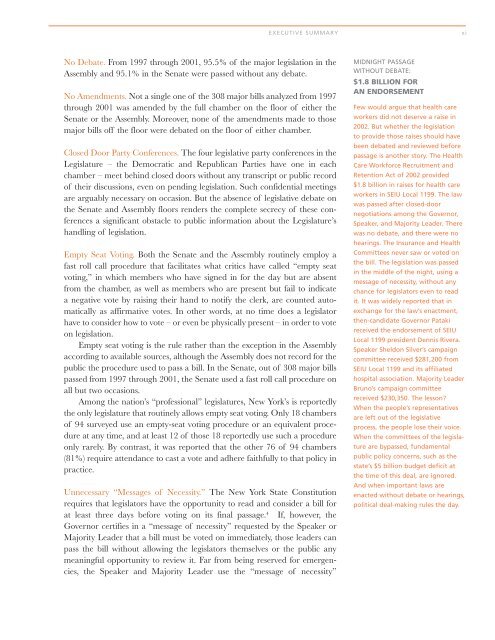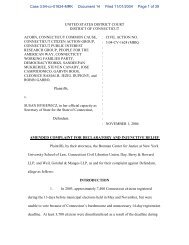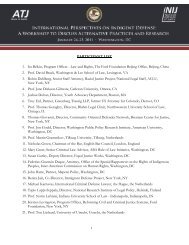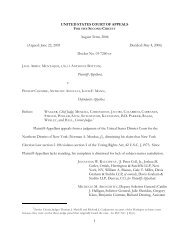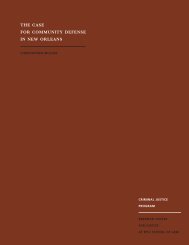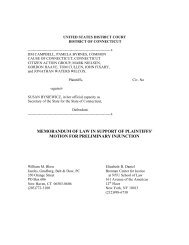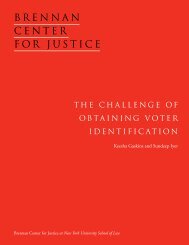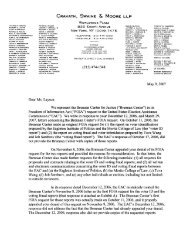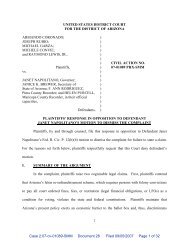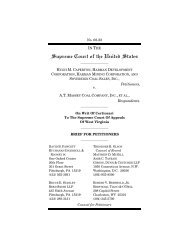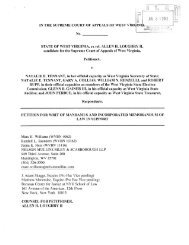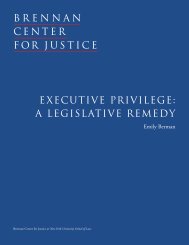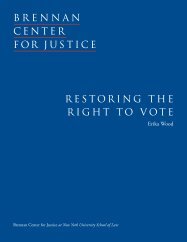THE NEW YORK STATE LEGISLATIVE PROCESS: AN ...
THE NEW YORK STATE LEGISLATIVE PROCESS: AN ...
THE NEW YORK STATE LEGISLATIVE PROCESS: AN ...
You also want an ePaper? Increase the reach of your titles
YUMPU automatically turns print PDFs into web optimized ePapers that Google loves.
No Debate. From 1997 through 2001, 95.5% of the major legislation in the<br />
Assembly and 95.1% in the Senate were passed without any debate.<br />
No Amendments. Not a single one of the 308 major bills analyzed from 1997<br />
through 2001 was amended by the full chamber on the floor of either the<br />
Senate or the Assembly. Moreover, none of the amendments made to those<br />
major bills off the floor were debated on the floor of either chamber.<br />
Closed Door Party Conferences. The four legislative party conferences in the<br />
Legislature – the Democratic and Republican Parties have one in each<br />
chamber – meet behind closed doors without any transcript or public record<br />
of their discussions, even on pending legislation. Such confidential meetings<br />
are arguably necessary on occasion. But the absence of legislative debate on<br />
the Senate and Assembly floors renders the complete secrecy of these conferences<br />
a significant obstacle to public information about the Legislature’s<br />
handling of legislation.<br />
Empty Seat Voting. Both the Senate and the Assembly routinely employ a<br />
fast roll call procedure that facilitates what critics have called “empty seat<br />
voting,” in which members who have signed in for the day but are absent<br />
from the chamber, as well as members who are present but fail to indicate<br />
a negative vote by raising their hand to notify the clerk, are counted automatically<br />
as affirmative votes. In other words, at no time does a legislator<br />
have to consider how to vote – or even be physically present – in order to vote<br />
on legislation.<br />
Empty seat voting is the rule rather than the exception in the Assembly<br />
according to available sources, although the Assembly does not record for the<br />
public the procedure used to pass a bill. In the Senate, out of 308 major bills<br />
passed from 1997 through 2001, the Senate used a fast roll call procedure on<br />
all but two occasions.<br />
Among the nation’s “professional” legislatures, New York’s is reportedly<br />
the only legislature that routinely allows empty seat voting. Only 18 chambers<br />
of 94 surveyed use an empty-seat voting procedure or an equivalent procedure<br />
at any time, and at least 12 of those 18 reportedly use such a procedure<br />
only rarely. By contrast, it was reported that the other 76 of 94 chambers<br />
(81%) require attendance to cast a vote and adhere faithfully to that policy in<br />
practice.<br />
Unnecessary “Messages of Necessity.” The New York State Constitution<br />
requires that legislators have the opportunity to read and consider a bill for<br />
at least three days before voting on its final passage. 4 If, however, the<br />
Governor certifies in a “message of necessity” requested by the Speaker or<br />
Majority Leader that a bill must be voted on immediately, those leaders can<br />
pass the bill without allowing the legislators themselves or the public any<br />
meaningful opportunity to review it. Far from being reserved for emergencies,<br />
the Speaker and Majority Leader use the “message of necessity”<br />
EXECUTIVE SUMMARY xi<br />
MIDNIGHT PASSAGE<br />
WITHOUT DEBATE:<br />
$1.8 BILLION FOR<br />
<strong>AN</strong> ENDORSEMENT<br />
Few would argue that health care<br />
workers did not deserve a raise in<br />
2002. But whether the legislation<br />
to provide those raises should have<br />
been debated and reviewed before<br />
passage is another story. The Health<br />
Care Workforce Recruitment and<br />
Retention Act of 2002 provided<br />
$1.8 billion in raises for health care<br />
workers in SEIU Local 1199. The law<br />
was passed after closed-door<br />
negotiations among the Governor,<br />
Speaker, and Majority Leader. There<br />
was no debate, and there were no<br />
hearings. The Insurance and Health<br />
Committees never saw or voted on<br />
the bill. The legislation was passed<br />
in the middle of the night, using a<br />
message of necessity, without any<br />
chance for legislators even to read<br />
it. It was widely reported that in<br />
exchange for the law’s enactment,<br />
then-candidate Governor Pataki<br />
received the endorsement of SEIU<br />
Local 1199 president Dennis Rivera.<br />
Speaker Sheldon Silver’s campaign<br />
committee received $281,200 from<br />
SEIU Local 1199 and its affiliated<br />
hospital association. Majority Leader<br />
Bruno’s campaign committee<br />
received $230,350. The lesson?<br />
When the people’s representatives<br />
are left out of the legislative<br />
process, the people lose their voice.<br />
When the committees of the legislature<br />
are bypassed, fundamental<br />
public policy concerns, such as the<br />
state’s $5 billion budget deficit at<br />
the time of this deal, are ignored.<br />
And when important laws are<br />
enacted without debate or hearings,<br />
political deal-making rules the day.


